数字经济 digital economy
数字经济英语词汇大全
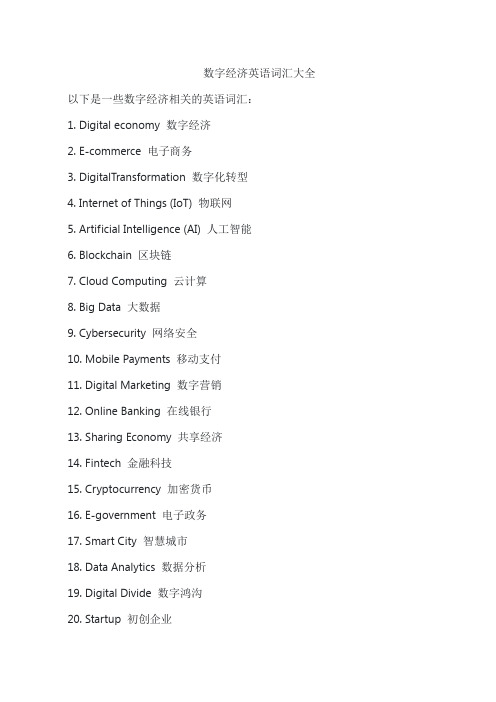
数字经济英语词汇大全以下是一些数字经济相关的英语词汇:
1. Digital economy 数字经济
2. E-commerce 电子商务
3. DigitalTransformation 数字化转型
4. Internet of Things (IoT) 物联网
5. Artificial Intelligence (AI) 人工智能
6. Blockchain 区块链
7. Cloud Computing 云计算
8. Big Data 大数据
9. Cybersecurity 网络安全
10. Mobile Payments 移动支付
11. Digital Marketing 数字营销
12. Online Banking 在线银行
13. Sharing Economy 共享经济
14. Fintech 金融科技
15. Cryptocurrency 加密货币
16. E-government 电子政务
17. Smart City 智慧城市
18. Data Analytics 数据分析
19. Digital Divide 数字鸿沟
20. Startup 初创企业
这只是一部分数字经济相关的英语词汇,随着技术的发展和新概念的出现,这个领域的词汇还在不断增加。
如果你需要更多特定领域的词汇,可以提供相关信息,我将尽力为你提供帮助。
关于数字经济的英语作文200字
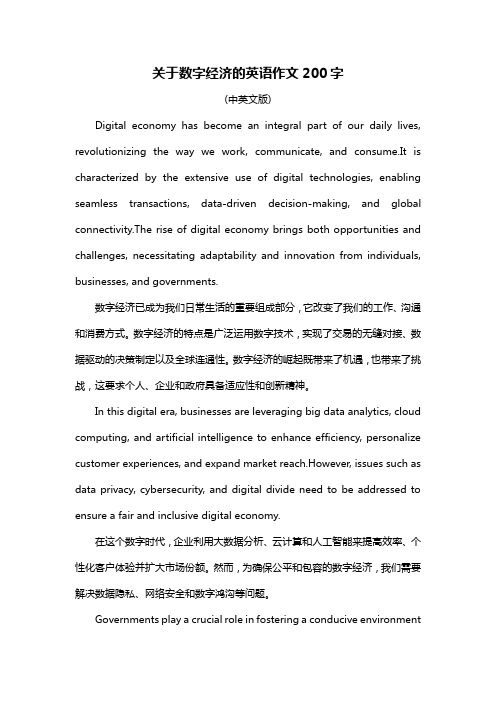
关于数字经济的英语作文200字(中英文版)Digital economy has become an integral part of our daily lives, revolutionizing the way we work, communicate, and consume.It is characterized by the extensive use of digital technologies, enabling seamless transactions, data-driven decision-making, and global connectivity.The rise of digital economy brings both opportunities and challenges, necessitating adaptability and innovation from individuals, businesses, and governments.数字经济已成为我们日常生活的重要组成部分,它改变了我们的工作、沟通和消费方式。
数字经济的特点是广泛运用数字技术,实现了交易的无缝对接、数据驱动的决策制定以及全球连通性。
数字经济的崛起既带来了机遇,也带来了挑战,这要求个人、企业和政府具备适应性和创新精神。
In this digital era, businesses are leveraging big data analytics, cloud computing, and artificial intelligence to enhance efficiency, personalize customer experiences, and expand market reach.However, issues such as data privacy, cybersecurity, and digital divide need to be addressed to ensure a fair and inclusive digital economy.在这个数字时代,企业利用大数据分析、云计算和人工智能来提高效率、个性化客户体验并扩大市场份额。
关于对数字经济发展现状及对策研究

关于对数字经济发展现状及对策研究数字经济(Digital Economy)是指以数字技术为核心,以数字信息、数字产品和数字服务为载体的现代经济形态。
随着数字化的普及程度不断提高,数字经济在全球范围内获得了快速而稳定的发展。
数字经济发展现状数字经济是全球经济发展的一个新时代,以其高效、便捷、智能的特点,已经成为许多国家经济发展的重要战略。
据统计,全球数字经济已经成为世界经济的重要组成部分,数字经济体量已经达到了数十万亿美元。
数字经济大大助推了互联网、人工智能、大数据、物联网等科技领域的快速发展,而这些领域的快速发展又推动了数字经济更进一步发展壮大。
数字经济发展的主要趋势数字经济的持续快速发展,表现出主要以下几个趋势:1.跨界合作趋势:数字经济正在打破各个行业之间的壁垒,推动新业态的涌现。
互联网公司与传统企业之间的合作越来越紧密,打造了许多新创业型合作企业。
2.数据共享和开放趋势:数据是数字经济的核心因素,共享大数据已成为数字经济发展的必然趋势,同时开放平台的出现使得数据共享变得更加容易。
3.智能化趋势:人工智能技术的蓬勃发展,推动了越来越多的产品和服务实现了智能化,以智能制造、智能物流、智能家居为代表的智能化模式正逐渐普及。
4.创新发展趋势:数字经济领域创新动力竞争越来越激烈,唯有更多的创新能够推动数字经济快速发展,提高数字化产品和服务的质量和效率。
数字经济发展的挑战数字经济的发展面临着一系列挑战,主要包括:1.隐私安全难题:随着人们对数字经济的依赖不断增加,数据保护就成了一个关键问题。
如何保护个人信息,防止数据被盗用等问题,必须得到全球范围内的共同关注。
2.教育与人才短缺:数字经济目前在全球范围内急需人才,这既是机遇也是挑战。
数字经济的快速发展,需要有适应新环境、新技术的专业人才和广泛人才。
教育、人才培养已成为保障数字经济发展的重要因素。
3.不平等性增加:数字经济的快速发展,使得数字技术在一些国家和地区的发展更快、实力更强,而一些国家和地区的发展相对较慢,数字鸿沟加重。
《数字经济报告》中文版(Digital Economy Report ).doc
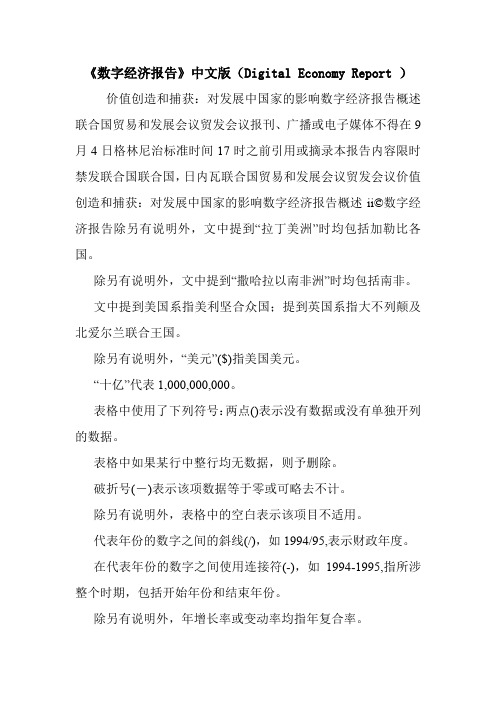
《数字经济报告》中文版(Digital Economy Report )价值创造和捕获:对发展中国家的影响数字经济报告概述联合国贸易和发展会议贸发会议报刊、广播或电子媒体不得在9月4日格林尼治标准时间17时之前引用或摘录本报告内容限时禁发联合国联合国,日内瓦联合国贸易和发展会议贸发会议价值创造和捕获:对发展中国家的影响数字经济报告概述ii©数字经济报告除另有说明外,文中提到“拉丁美洲”时均包括加勒比各国。
除另有说明外,文中提到“撒哈拉以南非洲”时均包括南非。
文中提到美国系指美利坚合众国;提到英国系指大不列颠及北爱尔兰联合王国。
除另有说明外,“美元”($)指美国美元。
“十亿”代表1,000,000,000。
表格中使用了下列符号:两点()表示没有数据或没有单独开列的数据。
表格中如果某行中整行均无数据,则予删除。
破折号(-)表示该项数据等于零或可略去不计。
除另有说明外,表格中的空白表示该项目不适用。
代表年份的数字之间的斜线(/),如1994/95,表示财政年度。
在代表年份的数字之间使用连接符(-),如1994-1995,指所涉整个时期,包括开始年份和结束年份。
除另有说明外,年增长率或变动率均指年复合率。
表内各分项数字或百分数由于四舍五入的缘故,其合计数未必与总计数相等。
v序言序言数字革命以前所未有的速度和规模改变了我们的生活和社会,带来巨大的机遇和严峻的挑战。
新技术可以为实现“可持续发展目标”做出重大贡献,但我们不能将积极成果视为理所当然。
如果要全面实现数字技术的社会和经济潜力,同时避免意外后果,我们必须紧急改善国际合作。
鉴于所涉及的高风险,我成立了一个数字合作高级别小组,以帮助扩充对所面对的重要数字机遇和挑战的理解。
小组汇集了各种专家,并提出了广泛的建议,包括如何通过开放、灵活和多利益攸关方的模式更好地管理数字技术发展。
本着同样的精神,在今天快速变化的环境中,我对联合国贸易和发展会议这份及时的《数字经济报告》表示欢迎,这份报告审查了数字经济的影响,特别是对发展中国家的影响。
数字经济

发展趋势
普惠性
共同富裕
新经济
数字经济时代的公平正义,不仅是人类的美好价值追求,也是社会主义的本质要求。数字经济时代的公平正 义,不仅是人类的美好价值追求,也是社会主义的本质要求。北京师范大学马克思主义学院教授徐斌提出,共同 富裕是社会主义公平正义的内在要求,我们要立足于时代发展,把社会主义本质、公平正义和共同富裕有机结合 起来。
数字经济是创造社会财富的新经济形态,将持续赋能经济实现高质量发展。西南财经大学经济学院教授韩文 龙提出,在数字经济时代,社会生产过程中的生产、流通、分配和消费四个环节正在实现数字化变革。其中,数 字生产力为经济高质量发展提供了新动力,数字流通力提升了资本周转与价值实现的效率,数字分配力的普惠效 应可以优化收入分配结构,数字消费力将助推产业转型升级,进一步扩大内需。
20世纪90年代以来,美国抓住了数字革命的机遇,创造了10多年的经济繁荣。欧洲、日本等地区和国家,也 紧紧追随着美国,积极推进数字革命,产生了巨大的成效。对于发展中国家来说,数字革命更是“千载难逢”的 良机。在数字时代中,发展中国家可以充分利用数字经济中的后发性优势,缩小与发达国家的数字鸿沟。印度就 是利用数字经济的后发性优势,使其信息技术在世界范围内具有强大竞争力,从而推动本国经济快速发展的典型 案例。
数字经济的特征表明,在知识的创新阶段,知识应用的范围越广泛,涉及到的客户越多,就能创造越多的价 值。在知识的普及阶段和模仿阶段,由于时效性问题,知识在发达国家的边际报酬下降。在发展中国家却能维持 很高的边际报酬。因为对于发展中国家来说,这些知识仍然是最新的、最具时间价值的。信息技术进入21世纪以 来正处于普及和模仿阶段,向发展中国家扩散符合发达国家的最高利益,这可以大大提高发展中国家的信息化速待》,数字经济位列第五位。
中国数字经济英语作文高中

中国数字经济英语作文高中中国数字经济在过去几年里迅速发展,成为全球数字化转型的重要引擎之一。
以下是我根据网上下载量较高的范文进行仿写的作文,希望你喜欢!Title: The Rise of China's Digital Economy。
In recent years, China's digital economy has experienced rapid growth, playing a pivotal role in the global digital transformation. This essay explores the various aspects of China's digital economy, its impact, challenges, and future prospects.Firstly, China's digital economy encompasses a wide range of sectors, including e-commerce, digital payments, fintech, artificial intelligence (AI), and big data analytics. Companies such as Alibaba, Tencent, and Baidu have spearheaded innovations in these areas, revolutionizing how businesses operate and how consumers interact with technology. For instance, the widespreadadoption of mobile payment platforms like Alipay and WeChat Pay has transformed traditional payment methods, making transactions faster, more convenient, and secure.Moreover, China's digital economy has contributed significantly to economic growth and employment. The riseof digital platforms has created new business opportunities, especially for small and medium-sized enterprises (SMEs), enabling them to reach a broader market and compete on a global scale. This has led to job creation in sectors such as e-commerce logistics, digital marketing, and software development, fostering innovation and entrepreneurship.Furthermore, the integration of AI and big data has revolutionized industries such as healthcare, finance, and manufacturing. AI-powered technologies enable predictive analytics, personalized recommendations, and automation, improving efficiency and decision-making processes. For example, AI algorithms help diagnose medical conditions, optimize supply chains, and detect fraudulent activities, leading to better outcomes and cost savings.Despite its remarkable achievements, China's digital economy faces several challenges. One of the key concernsis data privacy and cybersecurity. As digital transactions and data collection increase, protecting personalinformation and preventing cyber threats become paramount. Regulations and standards must be strengthened to safeguard data privacy and ensure secure digital infrastructure.Another challenge is bridging the digital divide, especially in rural areas and among underserved communities. Access to affordable internet connectivity, digitalliteracy, and digital skills training are essential to ensure inclusive growth and empower all segments of society to participate in the digital economy.Looking ahead, the future of China's digital economy is promising yet complex. Continued investments in digital infrastructure, research and development, and talent development are crucial to sustaining innovation and competitiveness. Collaboration between government, industry, and academia is also vital to address regulatory issues, foster a conducive business environment, and promoteresponsible use of technology.In conclusion, China's digital economy has emerged as a global powerhouse, driving innovation, economic growth, and societal transformation. While facing challenges such as data privacy and inclusion, the opportunities presented by digital technologies are vast and can lead to a more connected, efficient, and inclusive society.I hope this essay captures the essence of China'sdigital economy and its impact on various aspects of society. Let me know if there's anything else you'd like to explore or discuss!。
关于数字经济英文作文
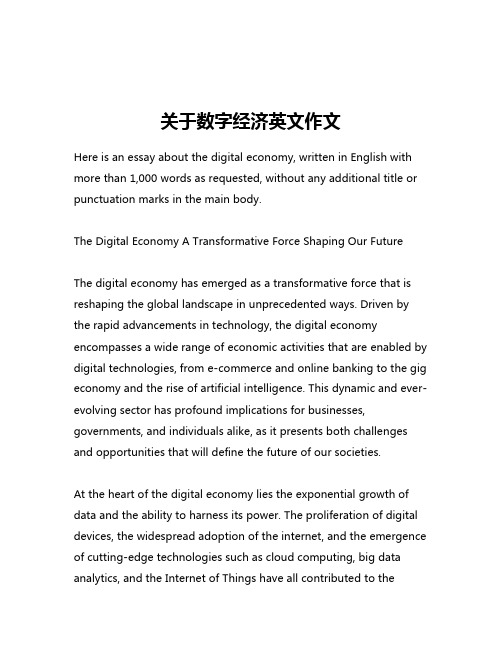
关于数字经济英文作文Here is an essay about the digital economy, written in English with more than 1,000 words as requested, without any additional title or punctuation marks in the main body.The Digital Economy A Transformative Force Shaping Our FutureThe digital economy has emerged as a transformative force that is reshaping the global landscape in unprecedented ways. Driven by the rapid advancements in technology, the digital economy encompasses a wide range of economic activities that are enabled by digital technologies, from e-commerce and online banking to the gig economy and the rise of artificial intelligence. This dynamic and ever-evolving sector has profound implications for businesses, governments, and individuals alike, as it presents both challenges and opportunities that will define the future of our societies.At the heart of the digital economy lies the exponential growth of data and the ability to harness its power. The proliferation of digital devices, the widespread adoption of the internet, and the emergence of cutting-edge technologies such as cloud computing, big data analytics, and the Internet of Things have all contributed to theexponential growth of data. This data, when properly collected, analyzed, and leveraged, has the potential to unlock new insights, drive innovation, and transform the way we live, work, and interact.One of the most significant impacts of the digital economy is the disruption of traditional business models. The rise of e-commerce and online platforms has fundamentally changed the way consumers access goods and services, forcing traditional brick-and-mortar businesses to adapt and evolve. Companies that have successfully navigated this transition, such as Amazon, Netflix, and Uber, have not only thrived but have also set new standards for customer experience and business efficiency.The gig economy, another key component of the digital economy, has also had a profound impact on the way we work. By leveraging digital platforms, individuals can now access a wide range of flexible, on-demand work opportunities, from freelance writing and graphic design to ride-sharing and food delivery. This shift has empowered workers to take greater control over their careers, while also presenting new challenges in terms of job security, benefits, and worker protections.The integration of artificial intelligence and automation into the digital economy has further amplified the pace of change. AI-powered algorithms are now capable of performing a wide range oftasks, from customer service and financial analysis to medical diagnosis and autonomous driving. While these technologies have the potential to increase efficiency, productivity, and access to services, they also raise concerns about job displacement and the need for workforce retraining and reskilling.Governments around the world have recognized the transformative potential of the digital economy and have implemented various policies and initiatives to foster its growth and development. These efforts range from investing in digital infrastructure and promoting digital literacy to developing regulatory frameworks that balance innovation with consumer protection and data privacy.However, the rapid evolution of the digital economy has also given rise to new challenges and ethical considerations. Issues such as data privacy, cybersecurity, and the equitable distribution of the benefits of technological progress have become increasingly pressing. Policymakers and industry leaders must work collaboratively to address these challenges and ensure that the digital economy serves the greater good of society.Despite these challenges, the digital economy presents immense opportunities for individuals, businesses, and nations. By embracing the digital transformation and harnessing the power of data and technology, we can drive economic growth, improve quality of life,and create a more sustainable and equitable future.For businesses, the digital economy offers new avenues for innovation, efficiency, and global reach. Companies that can effectively leverage digital technologies, such as e-commerce, cloud computing, and data analytics, can gain a competitive edge and unlock new revenue streams. Moreover, the rise of digital platforms has enabled small and medium-sized enterprises to access global markets and compete on a more level playing field.For individuals, the digital economy has opened up new possibilities for education, employment, and entrepreneurship. Online learning platforms, for instance, have democratized access to high-quality education, empowering individuals to acquire new skills and knowledge regardless of their geographic location or socioeconomic status. The gig economy, as mentioned earlier, has provided greater flexibility and autonomy in the workforce, allowing individuals to pursue their passions and balance work-life responsibilities.At the national level, the digital economy has become a crucial driver of economic growth and competitiveness. Countries that have invested in digital infrastructure, fostered a skilled workforce, and created a supportive regulatory environment have been able to attract foreign investment, spur innovation, and position themselves as leaders in the global digital landscape. The successfuldevelopment of the digital economy can also contribute to the achievement of broader societal goals, such as environmental sustainability, social inclusion, and the reduction of inequality.As we look to the future, the digital economy will undoubtedly continue to evolve and transform, presenting both challenges and opportunities. Navigating this dynamic landscape will require a collaborative and multifaceted approach, involving governments, businesses, and individuals working together to harness the power of digital technologies for the betterment of society.By embracing the digital economy and investing in the necessary infrastructure, skills, and policies, we can unlock new pathways for economic growth, social progress, and global cooperation. The digital economy is not merely a technological revolution; it is a fundamental shift in the way we live, work, and interact, and its impact will reverberate for generations to come.。
2023年100个必考社会热点词汇
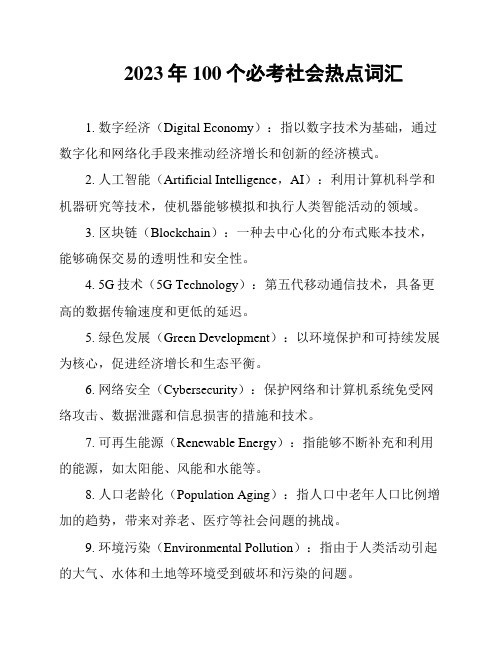
2023年100个必考社会热点词汇1. 数字经济(Digital Economy):指以数字技术为基础,通过数字化和网络化手段来推动经济增长和创新的经济模式。
2. 人工智能(Artificial Intelligence,AI):利用计算机科学和机器研究等技术,使机器能够模拟和执行人类智能活动的领域。
3. 区块链(Blockchain):一种去中心化的分布式账本技术,能够确保交易的透明性和安全性。
4. 5G技术(5G Technology):第五代移动通信技术,具备更高的数据传输速度和更低的延迟。
5. 绿色发展(Green Development):以环境保护和可持续发展为核心,促进经济增长和生态平衡。
6. 网络安全(Cybersecurity):保护网络和计算机系统免受网络攻击、数据泄露和信息损害的措施和技术。
7. 可再生能源(Renewable Energy):指能够不断补充和利用的能源,如太阳能、风能和水能等。
8. 人口老龄化(Population Aging):指人口中老年人口比例增加的趋势,带来对养老、医疗等社会问题的挑战。
9. 环境污染(Environmental Pollution):指由于人类活动引起的大气、水体和土地等环境受到破坏和污染的问题。
10. 人类基因编辑(Human Gene Editing):利用基因编辑技术对人类基因进行改变和修复,用于疾病治疗和基因改良等领域。
...100. 多元文化(Multiculturalism):指不同文化、宗教和民族之间相互交流、融合和共存的社会现象和理念。
以上是2023年100个必考社会热点词汇,涵盖了数字经济、人工智能、环境保护、人口老龄化等多个与社会发展密切相关的热点话题。
这些词汇将在各行各业的考试和讨论中频繁出现,了解和掌握它们对于跟上社会发展的步伐和拓宽知识面都非常重要。
- 1、下载文档前请自行甄别文档内容的完整性,平台不提供额外的编辑、内容补充、找答案等附加服务。
- 2、"仅部分预览"的文档,不可在线预览部分如存在完整性等问题,可反馈申请退款(可完整预览的文档不适用该条件!)。
- 3、如文档侵犯您的权益,请联系客服反馈,我们会尽快为您处理(人工客服工作时间:9:00-18:30)。
数字经济digital economy
The achievements, selected by a group of 39 experts from around the world, cover artificial intelligence, 5G, cloud computing, digital manufacturing, industrial internet and other internet-related fields.
来自世界各地的39位专家组成的专家组评选出来的成果,涵盖了人工智能、5G、云计算、数字制造、工业互联网以及其他互联网相关的领域。
“世界互联网领先科技成果发布活动”旨在展现全球互联网领域最新科技成果,弘扬互联网技术创新、绿色、包容和共享理念(innovative, green, inclusive and shared perception),彰显互联网领域从业者的非凡贡献,搭建全方位的创新交流平台。
这15项成果包括:鲲鹏920处理器(Huawei's Kunpeng 920 processor)、面向通用人工智能的异构融合天机芯片(hybrid Tianjic architecture towards artificial general intelligence)、统一自然语言预训练模型与机器阅读理解(machine reading comprehension)、特斯拉完全自动驾驶芯片(Tesla's full self-driving chip)、飞桨深度学习平台(deep learning platform Paddle Paddle)、智慧企业的AI创新与深入应用(in-depth application of AI in intelligent enterprises)等。
第六届世界互联网大会“世界互联网领先科技成果推荐委员会”中方主
任邬贺铨院士表示,
These achievements have given or will give a strong impetus to human life, scientific and technological progress, economic development and social transformation.
这些成果已经或将要为人类生活、科技进步、经济发展、社会变革赋予强大动力。
The internet turns 50 years old in 2019. The development of the internet has pushed human society into the intelligent era of comprehensive perception, reliable transmission, intelligent processing and accurate decision-making. Foreseeing these changes is the purpose for the release of the world's leading internet scientific and technological achievements. It also enables internet users to continuously explore their own potential and build confidence and strength to face a more exciting and challenging future, Wu added.
2019年互联网将迎来五十年。
互联网的发展推动人类社会进入了全面感知、可靠传输、智能处理、精准决策的智能时代。
预见这些变化是发布世界领先的互联网科技成果的目的。
他还说,这也使互联网用户能够不断发掘自己的潜力,建立信心和力量,来面对一个更加激动人心又充满挑战的未来。
2019年10月20日至22日,第六届世界互联网大会在浙江省桐乡市
乌镇举行。
大会主题为“智能互联开放合作——携手共建网络空间命运共同体(Intelligent Interconnection for Openness and Cooperation: Building a Community with a Shared Future in Cyberspace)”。
本次大会将聚集“科学与技术”、“产业与经济”、“人文与社会”、“合作与治理”四大重点板块,共设20个分论坛(20 sub-forums),秉持开放、平等、互信、共赢的理念,邀请全球互联网领军人物及重量级嘉宾共同探讨与回应当前国际社会对5G、人工智能、物联网等新技术、新业态发展的深度关切。
【相关词汇】
物联网Internet of Things (IoT)
数字经济digital economy
移动互联网mobile internet
科技创新science and technological innovation
对话式人工智能conversational AI。
